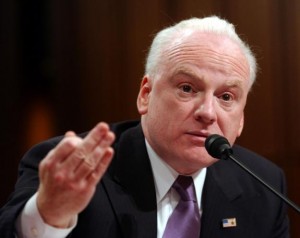If we are to ever close this chapter in our history, we MUST have another investigation, starting with the indictments of Dick Cheney, Rudy Guliani, George Tenet, Donald Rumsfeld, George Bush, Condoleeza Rice, and Larry Silverstein.
Charges must include obstruction of justice, treason, theft, destruction of evidence, destruction of private property, insurance fraud, tax evasion, and MURDER of 3000 Americans in NYC on 9/11, and the subsequent MURDER of Iraqi civilians in a false war to profit from the sale of oil contracts - War Profiteering.
Public Intelligence Net has consolidated two separate items that I repeat below. Net interest is high, this consolidated version is more reliable.
Public Intelligence Net has consolidated two separate items that I repeat below. Net interest is high, this consolidated version is more reliable.
Phi Beta Iota: Worth a full read. Comments at end below the line.
Richard Clarke Says CIA Tried to Recruit 9/11 Terrorists
An Explosive New 9/11 Charge (Daily Beast):
In a new documentary, former national-security aide Richard Clarke suggests the CIA tried to recruit 9/11
In a new documentary, former national-security aide Richard Clarke suggests the CIA tried to recruit 9/11 hijackers—then covered it up. Philip Shenon on George Tenet’s denial.
With the 10th anniversary of the 9/11 attacks only a month away, former CIA Director George Tenet and two former top aides are fighting back hard against allegations that they engaged in a massive cover-up in 2000 and 2001 to hide intelligence from the White House and the FBI that might have prevented the attacks.
The source of the explosive, unproved allegations is a man who once considered Tenet a close friend: former White House counterterrorism czar Richard Clarke, who makes the charges against Tenet and the CIA in an interview for a radio documentary timed to the 10th anniversary next month. Portions of the Clarke interview were made available to The Daily Beast by the producers of the documentary.
In the interview for the documentary, Clarke offers an incendiary theory that, if true, would rewrite the history of the 9/11 attacks, suggesting that the CIA intentionally withheld information from the White House and FBI in 2000 and 2001 that two Saudi-born terrorists were on U.S. soil – terrorists who went on to become suicide hijackers on 9/11.
Clarke speculates – and readily admits he cannot prove — that the CIA withheld the information because the agency had been trying to recruit the terrorists, while they were living in southern California under their own names, to work as CIA agents inside Al Qaeda. After the recruitment effort went sour, senior CIA officers continued to withhold the information from the White House for fear they would be accused of “malfeasance and misfeasance,” Clarke suggests.
Clarke said that if his theory is correct, Tenet and others would never admit to the truth today “even if you waterboarded them.”
Clarke’s theory addresses a central, enduring mystery about the 9/11 attacks – why the CIA failed for so long to tell the White House and senior officials at the FBI that the agency was aware that two Al Qaeda terrorists had arrived in the United States in January 2000, just days after attending a terrorist summit meeting in Malaysia that the CIA had secretly monitored.
In a written response prepared last week in advance of the broadcast, Tenet says that Clarke, who famously went public in 2004 to blow the whistle on the Bush White House over intelligence failures before 9/11, has “suddenly invented baseless allegations which are belied by the record and unworthy of serious consideration.”
The CIA insisted to the 9/11 Commission and other government investigations that the agency never knew the exact whereabouts of the two hijackers, Nawaf al-Hazmi and Khalid al-Mihdhar, inside the U.S.—let alone try to recruit them as spies.
Richard Clarke was an able public servant who served his country well for many years. But his recently released comments about the run up to 9/11 are reckless and profoundly wrong.
Clarke starts with the presumption that important information on the travel of future hijackers to the United States was intentionally withheld from him in early 2000. It was not. He wildly speculates that it must have been the CIA Director who could have ordered the information withheld. There was no such order. In fact, the record shows that the Director and other senior CIA officials were unaware of the information until after 9/11.
The handling of the information in question was exhaustively looked at by the 9/11 Commission, the Congressional Joint Inquiry, the CIA Inspector General and other groups.
The 9/11 Commission quite correctly concluded that “It appears no one informed higher levels of management in either the FBI or CIA about the case.”
In early 2000, a number of more junior personnel (including FBI agents on detail to CIA) did see travel information on individuals who later became hijackers but the significance of the data was not adequately recognized at the time.
Since 9/11 many systemic changes have been made to improve the watchlisting process and enhance information sharing within and across agencies.
Building on his false notion that information was intentionally withheld, Mr. Clarke went on to speculate–which he admits is based on nothing other than his imagination–that the CIA might have been trying to recruit these two future hijackers as agents. This, like much of what Mr. Clarke said in his interview, is utterly without foundation.
Many years after testifying himself at length before the 9/11 Commission but making no mention of his wild theory, Mr. Clarke has suddenly invented baseless allegations which are belied by the record and unworthy of serious consideration.
We testified under oath about what we did, what we knew and what we didn’t know. We stand by that testimony.
Phi Beta Iota: George Tenet is a known intellectual prostitute and Cofer Black is a known blow-hard and opportunist. Richard Clark, on the other hand, has a track record close to Charlie Allen’s, with integrity. This story should be read in tandem with the allegations that General Keith Alexander destroyed ABLE DANGER and withheld information from the FBI that would have stopped 9/11. On balance we continue to maintain:
1) 9/11 was not investigated properly. Dick Cheney, Rudy Guliani, and Larry Silverstein should be indicted and professionally interrogated (e.g. Col Stu Herrington brought out of retirement for this national mission).
2) 9/11 was known to be occurring by Dick Cheney and a handful of others, at least three months in advance. This allowed the scheduling of the nation-wide exercise that permitted Cheney to assure it went down as planned, while allowing Rumsfeld and others to augment it with a false-flag attack on the Pentagon that ostensibly destroyed the computers holding the forensic evidence on the missing 2.3 trillion.
3) Incompetence and hubris were Dick Cheney’s best allies. The FBI had two walk-ins prior to 9/11, one in Orlando and one in Newark, and blew both of them off.
In our view, Richard Clarke is now breaking ranks and putting his Oath to the Constitution ahead of the emphasis Washington places on “civility” (code for mutual protection society). CIA is known to have lied to Presidents, the Department of Justice is known to have lied to the Courts, the bottom line here is one of character. Richard Clarke has it, George Tenet and Cofer Black do not.





